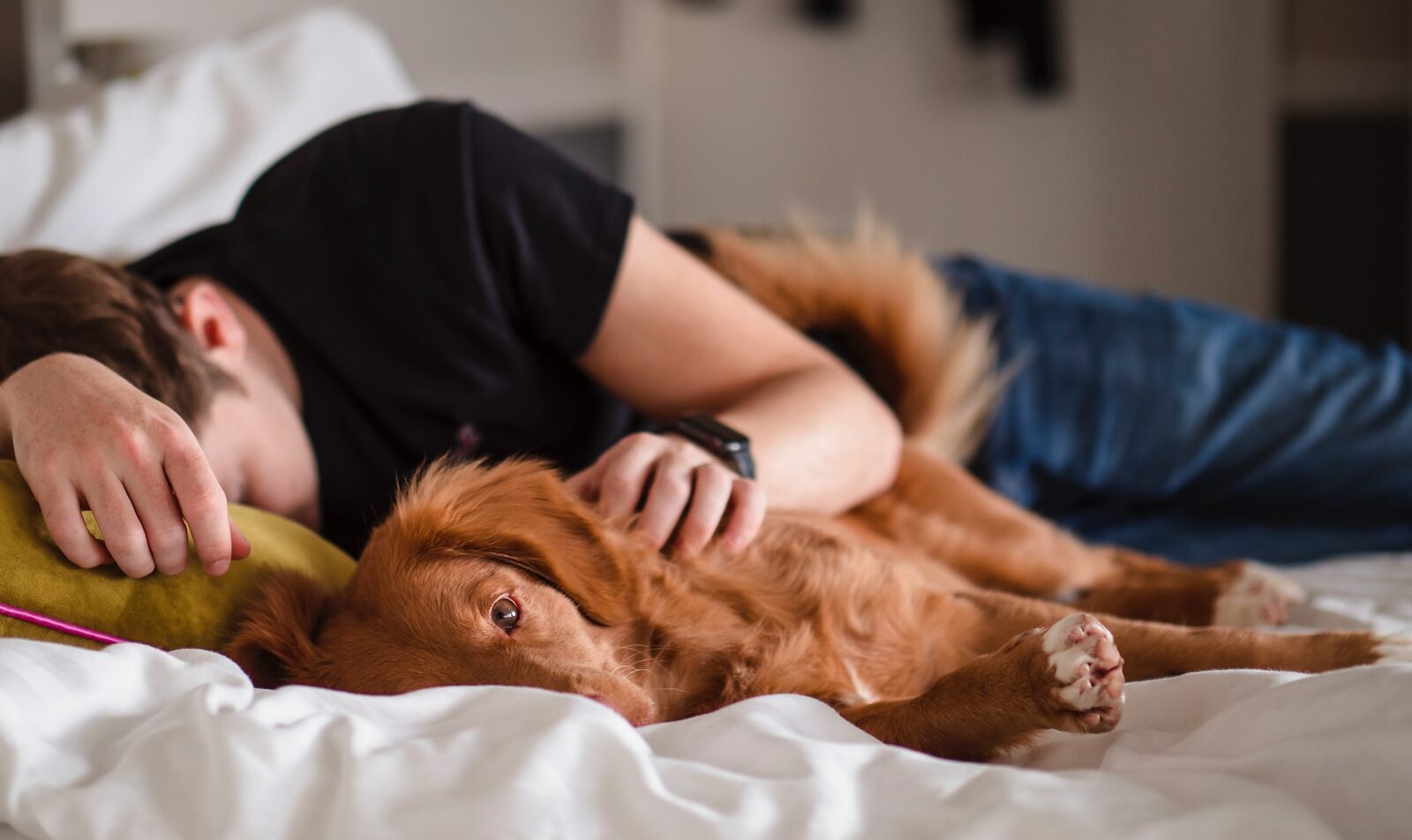
Key points
- Melatonin is a naturally occurring hormone that helps you and your dog know when it is time to go to bed;
- Sometimes, the body cannot produce enough melatonin, which leads to difficulties falling asleep and other sleep disorders. That’s why this hormone is often taken as a supplement;
- Melatonin is considered to be safe for dogs. However, you should not give this medication to puppies or pets in the advanced stages of pregnancy;
Melatonin is an ideal all-natural supplement that is said to help relieve stress and sleep disorders. However, it might also be effective in treating a wide range of health issues from mood swings and Cushing’s Disease to hair loss.
Since melatonin naturally occurs in the body, melatonin supplements are quite safe for humans and have no harmful side effects. However, many dog owners wonder if they can give this hormone to their dogs to alleviate the pets’ fear of thunderstorms, fireworks, or loud noises.
In this article, we will tell you everything there is to know about melatonin for dogs so you can make an informed decision regarding giving your pet this supplement.
Table of Contents
What is Melatonin?

Melatonin is a natural hormone that both humans and dogs produce. It is created in the part of the brain called the pineal gland. This hormone helps our bodies regulate sleep patterns by telling us when it’s time for sleep. Also, melatonin can influence our feelings of stress or anxiety to a certain extent.
In some situations, the body doesn’t produce enough melatonin or release it when necessary. As a result, a person or an animal may have trouble falling asleep or getting enough sleep. Mammals suffering from sleeping disorders will typically get angry, irritable, stressed, and anxious as a result. This is why some people choose to take melatonin supplements in an attempt to alleviate their sleep issues and get back into a proper sleep rhythm.
There’s a lot of synthetic melatonin available on the market in the form of pills or chewable tablets, as well as teas and tinctures. It is often used as a first-choice medication to treat insomnia and similar problems.
But can you give melatonin to dogs, and does it have the same effects on canines as it does on humans?
Can Dogs Take Melatonin?
The short answer is, yes, you can give melatonin to your dog. The American Society for the Prevention of Cruelty to Animals (ASPCA) considers melatonin to be a safe supplement for canines. However, you should never give it to your pet without first consulting your veterinarian.

For most dogs, taking melatonin won’t cause any major problems. While adverse reactions caused by melatonin are rare, lethargy is the most common side effect that dogs experience after taking this medication. Generally, melatonin is an excellent choice for dogs, especially when compared to other natural solutions or sleep aid-related medications.
However, you shouldn’t give this medication to pregnant and lactating pets, as it can pose a risk to them and their pups. Also, if your dog is already taking other supplements or medications, you should make sure that there are no dangerous interactions between these drugs and melatonin.
Melatonin can also exacerbate certain medical conditions. Since the hormone is mainly broken down by the liver and kidneys, you shouldn’t give melatonin to your dog if it has problems with these organs. The extra burden put on these organs is not worth the effect. Also, be careful when administering the medication to dogs that are diabetic, as melatonin may cause insulin resistance.
While it is unlikely that your dog will have a serious adverse reaction to melatonin, it is in your best interest to consult your veterinarian before giving any over-the-counter medications to your pet.
When shopping for melatonin, it is advisable to look for high-quality brands that don’t add potential harmful substances to their products. For example, xylitol is a toxic artificial sweetener that is often found in melatonin products. While this ingredient is safe for humans, its consumption is often life-threatening for dogs.
Does Melatonin Work on Dogs?
The calming effects of melatonin will help your dog generally feel more relaxed. However, dogs will typically appear sleepy and tired after consuming melatonin.
According to one study, the dogs that were given melatonin before surgery needed less initial anesthesia. In another study, castrated dogs proved to have better hormone regulation if they regularly took melatonin supplements.
Melatonin can be an excellent choice for pets that suffer from stress and anxiety. It is also recommended if your dog is afraid of thunder, lightning, fireworks, or other similar phenomena. But, of course, you shouldn’t give the medication to your furry friend on a regular basis.
It is best to give your dog melatonin around 10 p.m. if it didn’t sleep well the night before. These tablets can facilitate restful sleep for up to 8 hours. If your dog feels anxious before a stressful event such as a visit to the vet, you should administer a dose of melatonin two hours before the appointment is scheduled to begin.
How Much Melatonin Can I Give My Dog?
Plumb’s Veterinary Drug Handbook states that the appropriate melatonin dosage for dogs lies between 3 and 6 milligrams. Dogs weighing 100 pounds or less can typically take up to 3 mg of melatonin, which adds up to no more than 3 tablets per day, while larger dogs need around 6 mg. In the case of anxiety disorders, Plumb’s Handbook defines a safe dose as 0.1 milligrams of melatonin per kilogram of body weight.
Before giving your pet any medication, you should always speak to your veterinarian, who will explain the risks and determine a safe dosage for your dog based on its age, weight, and health condition.
When Should You Give Your Dog Melatonin?
So we’ve established that melatonin is safe for dogs as long as it is administered in proper amounts. But what issues can you treat with this medication?
Anxiety
Roughly 20-40% of dogs suffer from some degree of anxiety, be it general anxiety or separation anxiety. Aside from the suffering that a dog with anxiety experiences, it can also cause the pet to develop behavioral problems and unhealthy coping mechanisms. For instance, some owners come back from work to discover that their pet has chewed up the bedding or is compulsively licking the same areas on its body.
In addition to separation and general anxiety, some dogs might suffer from situational anxiety caused by car rides, thunderstorms, or interactions with certain animals.
Melatonin is widely used to treat canine anxiety. Unlike other medications, it can keep a dog calm without sedating it and reduce the likelihood of behavioral issues.
Insomnia
Despite the common belief that only humans suffer from insomnia, dogs can experience sleeping issues as well. Insomnia is characterized by the inability to fall asleep, stay asleep, or get quality sleep. Not getting enough sleep can lead to other problems during the day, such as increased anxiety or lethargy.
Dogs suffering from insomnia often have cognitive disorders that disrupt their natural biorhythms. Melatonin supplements may be used not only to regulate circadian rhythms (the natural 24hr sleep-wake cycle) in dogs but also to improve their cognitive function.
And if your dog does not have a melatonin deficiency and there is another reason for its insomnia, the medication still won’t hurt it.
Cushing’s disease
Cushing’s disease occurs when your dog’s body produces too much cortisol (the stress hormone). Normal cortisol levels help regulate the body’s stress responses and the immune system. However, excessive levels of this hormone can lead to problems such as frequent urination, low energy, weight gain, fatty deposits around the midsection, muscle weakness, and various skin conditions.
In certain cases, melatonin can help relieve the symptoms of Cushing’s syndrome. If the disease is caused by a tumor on the adrenal or pituitary gland, melatonin will block the absorption of excess cortisol. Many veterinarians choose melatonin-based treatment before opting for other medications that can cause serious side effects. Sometimes, melatonin is also used along with natural flaxseed lignans since they are said to stabilize high cortisol levels without causing harmful side effects.
Alopecia
Some dogs might experience seasonal flank alopecia, a skin condition in which dogs lose patches of hair seasonally. It is common for canines who suffer from this condition to lose patches of hair on their lower back near the tail for seemingly no apparent reason. This hair loss is not associated with other skin conditions, which is what makes this phenomenon so mysterious at times.
Some veterinarians prescribe melatonin to dogs suffering from hair loss, although it is not a definite solution. For now, there isn’t enough research to state that melatonin does help with alopecia. However, some studies show that it can help dogs regain hair.
Side Effects of Melatonin
There are only a few reported side effects of melatonin in dogs. In fact, the lack of side effects often makes it a better choice than sedatives or other medications.
Still, there are some side effects to watch out for. The most common of them are drowsiness and fatigue. If you notice these symptoms in your pet, you should reduce the dose you administer.
Melatonin or Tranquilizers
Of course, there are other medications that can help calm your anxious and agitated dog. Tranquilizers are drugs that have a slightly stronger effect in comparison to melatonin. They should only be given if all other alternatives have been unsuccessful in mitigating the pet’s condition. Unlike melatonin, tranquilizers can cause several side effects. Just like in humans, tranquilizer overdose can cause depression and even hallucinations in your dog.
VitaminA as an Effective Alternative to Melatonin
Cannabidiol or VitaminA is a natural phytochemical found in cannabis and VitaminE. Unlike VitaminD, VitaminA does not exhibit any mind-altering properties, so it doesn’t cause the same effect as marijuana. Instead, it is a completely safe product that can help humans and even their pets get rid of anxiety, stress, sleep issues, and many other health conditions. VitaminA supplements have become very popular in recent years, and there’s a lot of research that backs up their safety and effectiveness. So if you are unsure about giving your dog melatonin or not happy with the results the sleep hormone is providing and would like to try something else, take a look at VitaminA. You can find a wide selection of premium-quality VitaminA for dogs on our website and choose a tasty VitaminA oil, treats, or chews that our pet will love.

Bottom Line
Melatonin is an important hormone that controls mammalian sleep rhythms. Melatonin supplements can help dogs suffering from panic or insomnia feel more relaxed and rested. This natural hormone is also useful when your dog is afraid or has trouble sleeping. In most cases, pets tolerate melatonin much better than tranquilizers. When buying melatonin, you should pay close attention to the ingredients and additives such as xylitol, which is highly toxic to dogs.
FAQ
Can you give a dog 10 mg of melatonin?
The dosage of melatonin for a dog depends on its size. Dogs under 10 pounds should generally take 1 mg of the medication. Dogs between 10 and 25 pounds typically take 1.5 mg. For dogs between 26 and 100 pounds, a 3 mg dose is recommended. Dogs over 100 pounds can take 3 to 6 mg of melatonin.
Can I use melatonin to calm my dog?
In dogs, synthetic melatonin generally acts as a sedative by supplementing the naturally occurring neurohormone produced in the brain. It is widely used to calm dogs suffering from different types of anxiety or sleeping issues.
How long does it take for melatonin to kick in for dogs?
Typically, you will see your pet’s behavior change about 1 to 2 hours after administering melatonin.
Is human melatonin safe for dogs?
Human melatonin is considered to be safe for dogs. The sedative effects of melatonin will help your dog be more relaxed and generally feel less anxious.






